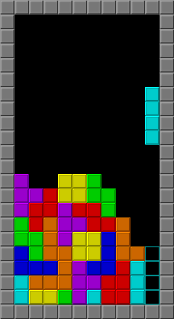 W
WTetris is a puzzle video game created by Soviet software engineer Alexey Pajitnov in 1984. It has been published by several companies for multiple platforms, most prominently during a dispute over the appropriation of the rights in the late 1980s. After a significant period of publication by Nintendo, the rights reverted to Pajitnov in 1996, who co-founded The Tetris Company with Henk Rogers to manage licensing.
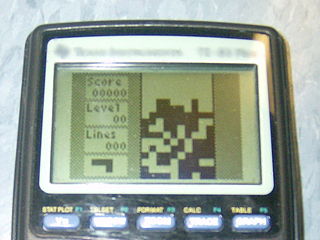 W
WThis is a list of variants of the game Tetris. It includes officially licensed Tetris sequels, as well as unofficial clones.
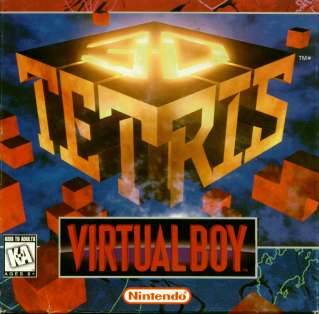 W
W3D Tetris is a 1996 puzzle video game developed by T&E Soft and published by Nintendo. It was released for the Virtual Boy on March 22, 1996, in North America. Players control multiple falling blocks, rotating and positioning them to clear layers in a three-dimensional environment similar to Tetris's gameplay. The game contains multiple modes and variations thereof, as well as different difficulty settings and levels. Parts of 3D Tetris are rendered as 3D wire-frame models. A version of the game entitled Polygo Block was to be released in February 1996 in Japanese markets, but never emerged. The game received mostly negative reviews with critics panning it for a lack of originality.
 W
WThe Classic Tetris World Championship (CTWC) is a video game competition series, hosted by the Portland Retro Gaming Expo. The competition launched in 2010, during the filming of Ecstasy of Order: The Tetris Masters to determine the world's greatest Tetris player. In its first two years, the competition was held in Los Angeles, California, but was moved to Portland, Oregon, in 2012, and has been held there annually since.
 W
WSolomon Wolf Golomb was an American mathematician, engineer, and professor of electrical engineering at the University of Southern California, best known for his works on mathematical games. Most notably, he invented Cheskers in 1948 and coined the name. He also fully described polyominoes and pentominoes in 1953. He specialized in problems of combinatorial analysis, number theory, coding theory, and communications. His game of pentomino inspired Tetris.
 W
W"Korobeiniki" is a nineteenth-century Russian folk song that tells the story of a meeting between a peddler and a girl, describing their haggling over goods in a metaphor for courtship.
 W
W"Love Me or Hate Me" is the sixth single from English grime artist Lady Sovereign and the fourth from her debut album Public Warning. The single was confirmed for release by her official website and was released in October 2006. The song was produced by Lukasz "Dr. Luke" Gottwald. The video features Lady Sovereign appearing in Tetris-style blocks, and acting out certain lyrics of the song.
 W
WMagical Tetris Challenge is a puzzle game by Capcom for the Nintendo 64, Game Boy Color, and PlayStation. It is a version of Tetris featuring Disney characters. It is one of the few Nintendo 64 games to be entirely in 2D.
 W
WJonas Neubauer was an American Tetris player, seven-time champion at the Classic Tetris World Championship, and taproom manager.
 W
WThe New Tetris is a puzzle video game for the Nintendo 64. The game was developed by H2O Entertainment and published by Nintendo, based on the latter's popular Tetris series. The game was originally released on July 31, 1999, in North America.
 W
WAlexey Leonidovich Pajitnov is a Russian-American video game designer and computer engineer. He is best known for developing Tetris in 1984 while working for the Dorodnitsyn Computing Centre of the Soviet Academy of Sciences, a Soviet government-founded R&D center.
 W
WPuyo Puyo Tetris is a puzzle video game developed by Sonic Team and published by Sega. The game is a crossover between the Puyo Puyo series and the Tetris franchise, and features various gameplay modes incorporating both aspects. The game includes characters modeled and named after the seven Tetrominos, which are different puzzle pieces each made of four blocks.
 W
WPuyo Puyo Tetris 2 is a puzzle video game developed by Sonic Team and published by Sega. It is a direct sequel to Puyo Puyo Tetris. The game was released for PlayStation 4, Xbox One, Nintendo Switch, PlayStation 5 and Xbox Series X/S in December 2020, with a Microsoft Windows version released in March 2021. The game released to positive reviews.
 W
WSpellTower is a puzzle video game by Zach Gage in which the player creates words from a jumble of letter tiles to clear the screen before it refills. The game has several game modes and a multiplayer battle mode. The impetus for the game—the concept of combining elements from Tetris and Boggle in what was a prototype of the puzzle video game Puzzlejuice—inspired Gage to create SpellTower. The game released for iOS in November 2011 to generally favorable reviews. Versions for OS X and Android followed over the next two years. In 2017 SpellTower Minutes was released. This browser-based Flash game created special "blitz" like modes not found in the mobile releases. A new iOS version released in 2017 swapped out the unnamed dictionary and began using Merriam-Webster's Third New International Dictionary, Unabridged. French and Dutch language specific versions were also released. A 2020 release, SpellTower+, added new game modes, cleaner visuals, and a jazz soundtrack.
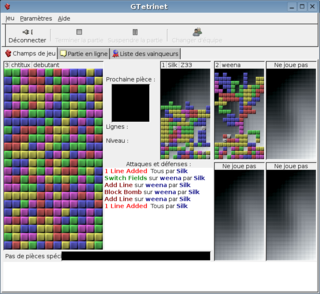 W
WTetriNET is a multiplayer online Tetris game for up to six people, that supports team play.
 W
WTetris is a puzzle game developed by Atari Games and originally released for arcades in 1988. Based on Alexey Pajitnov's Tetris, Atari Games' version features the same gameplay as the computer editions of the game, as players must stack differently shaped falling blocks to form and eliminate horizontal lines from the playing field. The game features several difficulty levels and two-player simultaneous play.
 W
W"Tetris" is a song arranged by English composer Andrew Lloyd Webber and English record producer Nigel Wright, collaborating under the pseudonym Doctor Spin. The composition is based on the theme to the 1989 Game Boy game Tetris, which itself is based on the Russian folk song "Korobeiniki". Doctor Spin released their version of "Tetris" on 21 September 1992 through Polydor and Carpet Records; it reached number six on the UK Singles Chart and also charted in Austria, Finland, and Ireland. This song, along with "Supermarioland" by Ambassadors of Funk, commenced a brief trend of recreated video game music entering mainstream popularity.
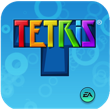 W
WTetris is a puzzle video game developed by EA Mobile and published by Electronic Arts for iOS, Android, BlackBerry OS, PlayStation 3, PlayStation Portable and Windows Phone. The game featured gameplay like other Tetris titles, with a new soundtrack.
 W
WTetris is a puzzle video game developed and published by Nintendo for the Game Boy in 1989. It is a portable version of Alexey Pajitnov's original Tetris and it was bundled with the North American and European releases of the Game Boy itself. It is the first game to have been compatible with the Game Link Cable, a pack-in accessory that allows two Game Boy consoles to link for multiplayer purposes. A colorized remake of the game was released on the Game Boy Color titled Tetris DX . A Nintendo 3DS Virtual Console version of Tetris was released in December 2011, lacking multiplayer functionality.
 W
WTetris is a puzzle video game for the Nintendo Entertainment System (NES) released in 1989, based on Tetris (1984) by Alexey Pajitnov. It is the first official console release of Tetris to have been developed and published by Nintendo. It was released after two earlier NES versions of Tetris, an official Family Computer version released by Bullet-Proof Software in Japan and an unofficial Atari version released by Tengen in North America.
 W
WTetris & Dr. Mario is a 1994 puzzle video game compilation developed by Intelligent Systems and published by Nintendo for the Super Nintendo Entertainment System. It contains enhanced remakes of Tetris (1989) and Dr. Mario (1990), which were originally released for both the Nintendo Entertainment System and Game Boy in North America. Both games include split-screen multiplayer and a "Mixed Match" mode that transitions between the two games.
 W
WTetris 2 is a 1990 video game by František Fuka (Fuxoft). It is inspired by a Soviet game Tetris. It is considered to be the most successful game developed by Fuka.
 W
WTetris 2 is a video game published in 1993 and 1994 by Nintendo for the Game Boy, Nintendo Entertainment System and Super Nintendo Entertainment System.
 W
WTetris 64 is a puzzle video game for the Nintendo 64. It was released only in English in Japan in 1998, and is the only Nintendo 64 game that works with the bio sensor accessory, which it included.
 W
WTetris 99 is an online version of the tile-matching video game Tetris, developed by Arika, and published by Nintendo for the Nintendo Switch in February 2019. The software is free, but only to Nintendo Switch Online subscribers. Incorporating elements of the battle royale genre, Tetris 99 has up to 99 players competing simultaneously to complete rows with falling tetrominoes, which in turn send attacks in the form of "garbage rows" to other players with the goal of knocking them out of the game.
 W
WTetris Attack, also known as Panel de Pon, is a 1995 puzzle video game developed by Intelligent Systems and published by Nintendo for the Super Nintendo Entertainment System. A Game Boy version was released a year later. In the game, the player must arrange matching colored blocks in vertical or horizontal rows to clear them. The blocks steadily rise towards the top of the playfield, with new blocks being added at the bottom. Several gameplay modes are present, including a time attack and multiplayer mode.
 W
WTetris Battle Gaiden is a puzzle video game developed and published in 1993 by Bullet Proof Software for the Super Famicom. Released only in Japan, the game is a variant of the Tetris series involving multiplayer battles comparable to those of the Puyo Puyo and Columns series of video games.
 W
WTetris Blitz was a variant of Tetris. It was developed by EA Salt Lake published by Electronic Arts. It was released free on mobile platforms such as iOS, Android, and Windows Phone. It was released in 2013 and was given mixed reviews. On January 20, 2020, EA announced that the game would be discontinued on April 21, 2020. As of April 22, 2020, it is no longer playable.
 W
WThe Tetris Company, Inc. (TTC) is based in Nevada and is owned by Henk Rogers, Alexey Pajitnov and Blue Planet Software. The company is the exclusive licensee of Tetris Holding LLC, the company that owns Tetris rights worldwide. It licenses the Tetris brand to third parties.
 W
WTetris DS is a puzzle video game developed and published by Nintendo. It was released for the Nintendo DS on March 20, 2006, in North America, April 13, 2006, in Australia, April 21, 2006, in Europe, and April 27, 2006, in Japan. An installment of the Tetris franchise, the game supports up to ten players locally, and supported online multiplayer of up to four players using Nintendo Wi-Fi Connection prior to its discontinuation.
 W
WThe Tetris effect occurs when people devote so much time and attention to an activity that it begins to pattern their thoughts, mental images, and dreams. It takes its name from the video game Tetris.
 W
WTetris Effect is a tile-matching puzzle video game developed by Japanese studios Monstars and Resonair and published by Enhance Games. The game was released worldwide exclusively for the PlayStation 4 on November 9, 2018, and features support for the PlayStation VR. A Microsoft Windows version, with support for Oculus Rift and HTC Vive, was released on July 23, 2019. The game garnered high praise from critics and was named Game of the Year by several publications. An enhanced version, named Tetris Effect: Connected, was announced for Xbox One, Xbox Series X/S and Windows 10 during Xbox Games Showcase on July 23, 2020, and was released on November 10, 2020. The expansion was made available for existing platforms in August 2021. A Nintendo Switch version was released on October 8, 2021.
 W
WTetris Friends was an online Tetris game developed by Tetris Online, Inc. Registered users were able to compare their scores with their friends and with the entire community. It was the only official Flash implementation of Tetris made by the Tetris company itself. At the time, it was also the only official Tetris platform that had advertisements play before a match Tetris Friends had over a million registered users.
 W
WTetris Giant, known as Tetris Dekaris in Japan, is an arcade game released in Japan in 2009 by Sega that features a giant version of the game Tetris. It is played on a large 70" DLP Projection Monitor, running on Sega System SP. It is controlled using giant joysticks, the right joystick being slightly lower than the left one, with a built-in shaker "rumble" motor, a device that Sega refers to as "Deka Lever". The playing field is 6 cells wide by 7 cells high as opposed to almost universal 10 cells wide by 20 high. The game can be played with up to two players.
 W
WTetris Holding, LLC v. Xio Interactive, Inc., 863 F.Supp.2d 394, was a 2012 American legal case related to copyright of video games, confirming that a game's look and feel can be protected under copyright law. Tetris Holding is a company that holds the copyright to the original Tetris game from 1984 and licenses those rights to game developers. Xio Interactive is a game developer that released Mino in 2009, a mobile game based on the gameplay of Tetris. Mino was downloaded millions of times, and Tetris Holding filed a DMCA notice and eventually a lawsuit against Xio for copyright infringement.
 W
WTetris Party is a puzzle video game by Hudson Soft for WiiWare. An installment of the Tetris series, the game supports the use of Miis and the Wii Balance Board, and features both local and online multiplayer in addition to several single-player modes unique to the game.
 W
WTetris Plus is a puzzle video game developed by Natsume and published by Jaleco for arcades in 1996, and ported to the Game Boy, Sega Saturn, and PlayStation later that year. The game would be followed by a sequel, Tetris Plus 2, in 1997. Ports were to be developed for the Atari Jaguar and Nintendo 64 but these never released.
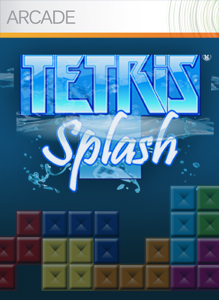 W
WTetris Splash is a puzzle video game, part of the Tetris games, was published by Microsoft Game Studios for the Xbox 360 via Xbox Live Arcade. It is the first game produced by Tetris Online, Inc.
 W
WTetris Ultimate is a puzzle video game developed by American studio SoMa Play and published by Ubisoft. Ubisoft partnered with The Tetris Company to develop the game to celebrate the 30th anniversary of the Tetris franchise.
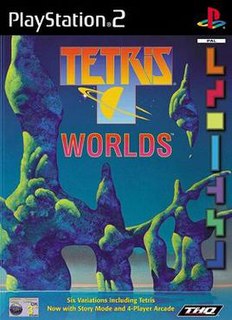 W
WTetris Worlds is a version of the video game Tetris. Originally released in 2001 for Microsoft Windows and Game Boy Advance, it was later released for Xbox, GameCube, and PlayStation 2 in 2002. In 2003, an Xbox Live version and a single-disc compilation version were released for the Xbox. The latter was bundled with Xbox systems.
 W
WTetris: Axis, released as Tetris in some regions, is a puzzle video game for the Nintendo 3DS developed by Hudson Soft and Bandai and was published by Nintendo. The game was released in all regions in October 2011 and was published by Namco Bandai Games and Tetris Online in Japan and PAL regions respectively.
 W
WTetris: The Grand Master is a series of puzzle arcade video games created by Arika.
 W
WTetrisphere is a falling block puzzle video game for the Nintendo 64 (N64) console. Developed by Canadian company H2O Entertainment, a nearly complete version of the game was originally slated for release on the Atari Jaguar in early 1995. After Nintendo obtained its publishing rights, Tetrisphere was reworked for the N64 and released on the platform in North America on August 11, 1997, and the PAL regions in February 1998.
 W
WA tetromino is a geometric shape composed of four squares, connected orthogonally. Tetrominoes, like dominoes and pentominoes, are a particular type of polyomino. The corresponding polycube, called a tetracube, is a geometric shape composed of four cubes connected orthogonally.
 W
WV-Tetris is a 1995 puzzle video game developed by Locomotive and published by Bullet-Proof Software in Japan for the Virtual Boy. Its gameplay involves the player clearing horizontal lines by moving pieces of different shapes that descend onto the playing field by filling empty spaces in order to make completed lines disappear and gain points across three modes of play.
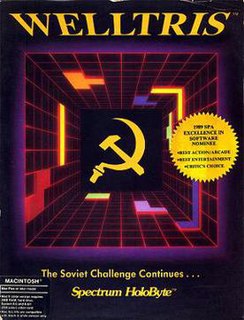 W
WWelltris is a puzzle video game, developed by Doca and licensed to Bullet-Proof Software. Adaptations were made by Sphere, Inc., for Spectrum Holobyte, and by Infogrames. It was originally released for MS-DOS and Macintosh in 1989. It was subsequently ported to the Amiga, Amstrad CPC and Atari ST in 1990 and the ZX Spectrum and Commodore 64 in 1991.
 W
WWordtris is a Tetris offshoot designed by Sergei Utkin, Vyacheslav Tsoy and Armen Sarkissian and published by Spectrum Holobyte in 1991 for the IBM PC platform. The game was released for the Game Boy and Super NES in 1992.
 W
W